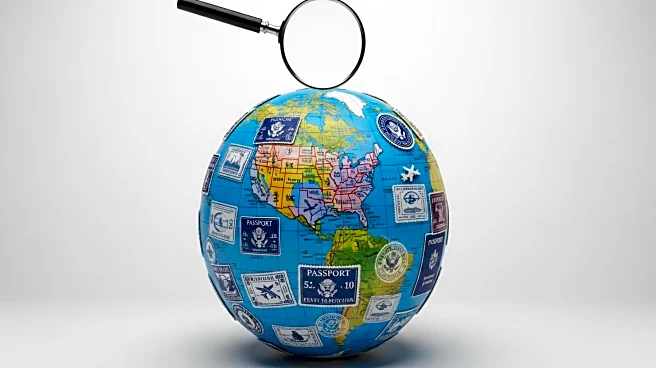What is the story about?
What's Happening?
The United States is set to increase visa fees for foreign travelers, a move that will affect visitors from over 40 countries participating in the Visa Waiver Program. This change, part of the Trump administration's 'One Big Beautiful Bill,' will see the Electronic System for Travel Authorization (ESTA) fee nearly double from $21 to $40 starting September 30. Additionally, travelers entering the U.S. through land borders will experience a rise in the I-94 Arrival/Departure Record fee from $6 to $30. A new $30 enrollment fee for the Electronic Visa Update System will also be introduced for travelers from China. These fee hikes come amid a significant downturn in international travel to the U.S., with the World Travel and Tourism Council projecting a $12.5 billion loss in international visitor spending for 2025.
Why It's Important?
The increase in visa fees is significant as it could further deter international travelers from visiting the U.S., exacerbating the current slump in tourism. The tourism industry, already struggling due to global travel restrictions and economic uncertainties, may face additional challenges as potential visitors reconsider their travel plans due to higher costs. This could impact various sectors reliant on tourism, including hospitality, retail, and transportation, potentially leading to economic repercussions in regions heavily dependent on international visitors. The introduction of a 'visa integrity fee' also raises questions about compliance and enforcement, which could add complexity to the travel process.
What's Next?
The implementation of these fee increases is scheduled for September 30, and it remains to be seen how international travelers and the tourism industry will respond. The Department of Homeland Security has indicated that the 'visa integrity fee' requires further cross-agency coordination before it can be applied, suggesting potential delays or adjustments. Stakeholders in the tourism and travel sectors may lobby for reconsideration or mitigation measures to offset the anticipated decline in visitor numbers. Monitoring the impact on travel patterns and economic outcomes will be crucial in the coming months.
Beyond the Headlines
The fee increases may also have diplomatic implications, as they affect citizens from some of the U.S.'s closest allies. This could lead to discussions or negotiations at the governmental level to address concerns over travel accessibility and bilateral relations. Additionally, the changes highlight ongoing debates about immigration and border security policies, reflecting broader political and social dynamics in the U.S.
















